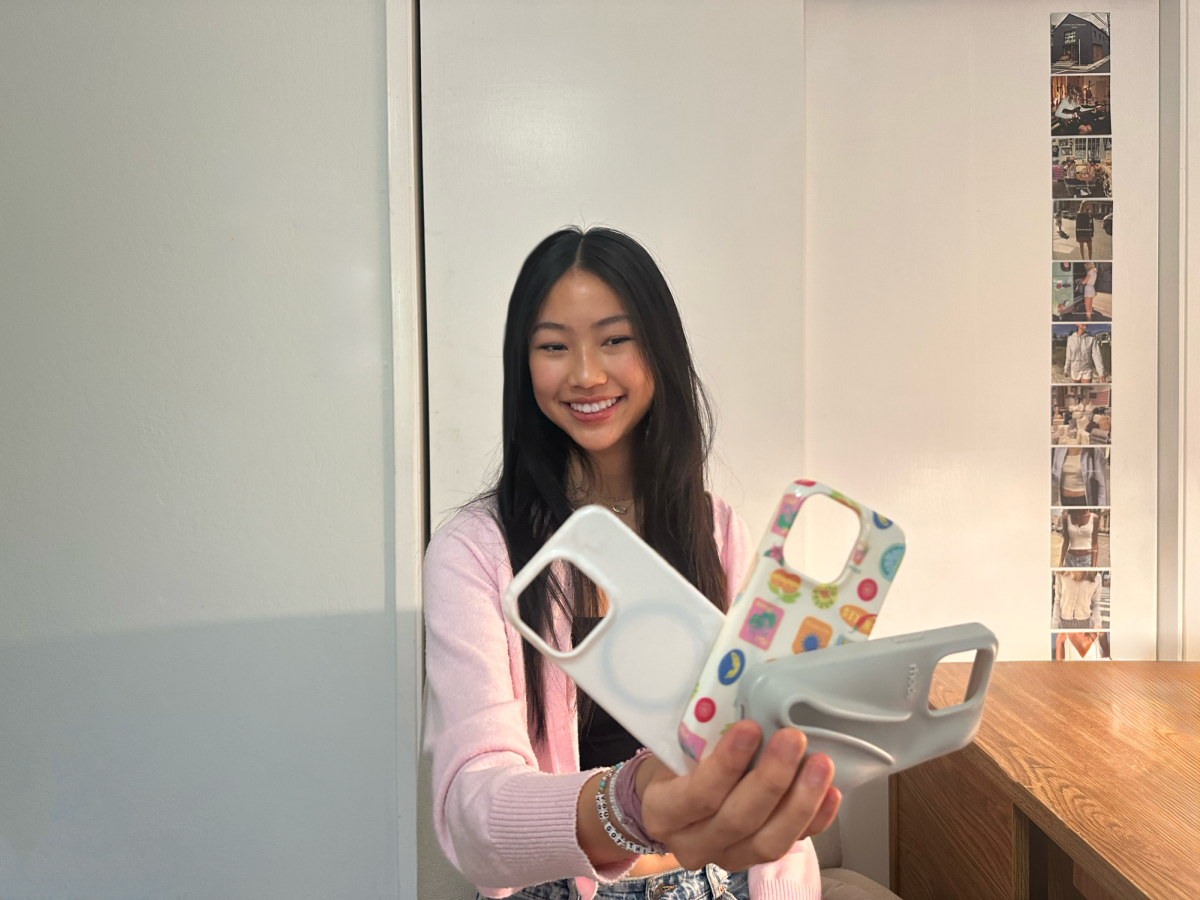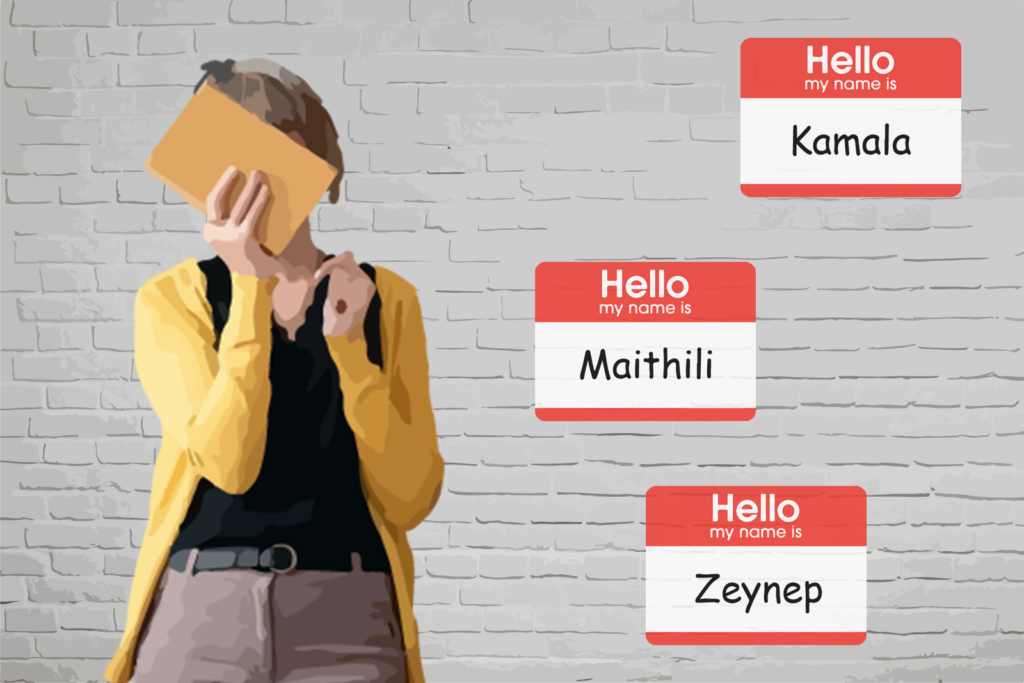Sophomore Maithili Kulkarni knows what will happen on the first day of class.
“Throughout elementary and middle school, whenever a teacher would do attendance and stop or stutter at a name, I knew it was me,” she said. “Even my classmates would start to help explain how my name should be pronounced.”
Her first name, correctly pronounced may-teh-lee, represents a Hindu goddess named Sita, the princess of Mithila. In the past, she has seen her name pronounced as my-tee-lee or even may-tuh-lie.
A name can serve as a crucial component of a person’s identity and hold great cultural significance. But according to Joe Pinsker of the Atlantic, people in the U.S. with traditional cultural names have historically felt pressure to change their names in order to assimilate with European names.
In the U.S., many people with names that are considered different face microaggressions stemming from purposeful mispronunciation.
Blogger Jennifer Gonzalez categorized people who encounter hard-to-pronounce names into three groups: the fumbler-bumblers, arrogant manglers and calibrators.
The fumbler-bumblers try to pronounce a difficult name correctly but give up after a while. The arrogant manglers butcher the name without a second thought. The calibrators are the ones who make sure they are pronouncing someone’s name correctly.
Kulkarni recalls a time in middle school when she met an arrogant mangler substitute teacher who butchered her name. She felt “confused and embarrassed” and did not know what to do, so she simply raised her hand and said “here” quietly.
“I think it's understandable for someone who has never seen my name to be unsure on how to pronounce it,” Kulkarni said. “But I really appreciate the people who try to pronounce it correctly, even if it takes a few tries for them to get it. It can be frustrating when the other person doesn't seem to care and calls me by a random pronunciation or worse, doesn't even try.”
According to Psychology Today, the act of mispronouncing someone’s name can sometimes fall under the category of name-based microaggressions. Microaggressions are defined as everyday, subtle instances of discrimination against marginalized populations that can be committed both intentionally and unintentionally. Other examples of such microaggressions include giving someone an unwanted nickname, teasing them and forming biases against individuals based on their names.
Kulkarni, however, said she has gotten used to the confusion people face when seeing her name.
“Growing up in Saratoga with an unfamiliar Indian name made it very common for my name to be mispronounced,” she said.
Mispronunciations in the school setting are a common experience for people with uncommon names. In a 2019 study from Columbia University, participants described the most frequent mispronunciation microaggressions they’ve had with people in authoritative positions, such as teachers.
Despite this recurring challenge, Kulkarni said she has never wished for a different name.
“Even when I had to deal with difficulties because of my name, I never resented it,” she said. “Rather, I was proud of its uniqueness and the depth of culture behind it.”
Still, many other Americans with hard-to-pronounce names opt to refer to themselves using a different moniker to avoid any confusion or judgment. Immigrants change their names for multiple reasons, including the desire to avoid discrimination and to create a new identity.
Senior Shin Hwa Hsu, who goes by Cindy, said she goes by different names depending on the context.
“In Taiwan, people call me by my Chinese name whereas, in America or other places I visit, I use my English name,” she said.
Hsu also said that while she has not officially changed her legal name, she is considering it in the future to make it easier for her and others.
Similarly, when sophomore HongYu Guo first moved to America from China in 2016, he chose to go by his middle name, Tony, at school.
“I didn’t want all my teachers and friends to say my name wrong since it has a special meaning behind it,” Guo said. “I also wanted to save the pain a teacher has to go through every time they see my name.”
According to a 2012 study by Santa Clara University professors Rita Kohli and Daniel Solorzano, the mispronunciation of names can be a burden on students, making them feel invalid and ashamed. For example, one Asian American woman in the study changed her name out of embarrassment because it was constantly butchered by her teachers and school administrators.
Guo understands that people have difficulties pronouncing his name, but he resents purposeful mispronunciation.
“I don’t mind if someone pronounces my name wrong innocently, but if someone intentionally makes fun of my name, then it’s not acceptable,” Guo said.
Hsu said she does sometimes feel frustrated with constantly having to correct her teachers and peers.
Although students may feel uncomfortable or discouraged when someone pronounces their names wrong, most teachers actively try to learn them to the best of their abilities.
Drama teacher Bryan Ringsted understands the trouble that students have to go through when their names are mispronounced and said he makes it clear on the first day of class that he may struggle with students’ names.
“It’s pretty awkward when I butcher a student’s name,” Ringsted said. “I want to treat them with the respect and kindness they deserve, and the first step in that is pronouncing their name correctly. Our names make us uniquely us, they are one of the only things that belong to only us and are impossible to strip away.”
Ringsted said that he uses the IPA (International Phonetic Alphabet) so he can make sure he pronounces unfamiliar names correctly. He also said he appreciated when students put in the effort to help him learn by correcting him and is happy to call students by their desired names.
Sometimes, a student’s name might simply be too unique or unfamiliar for Ringsted to pronounce correctly, but he said he will always try as hard as possible to get it right.
“I will work as hard as I can to meet you where you are, but if a name derives from a language or culture I'm truly unfamiliar with, I might just not be good enough to get it right,” Ringsted said. “At the end of the day, I'll work as hard as my students will, so if they are willing to correct me, I'm here to get it right.”
Despite the challenges she faces, Kulkarni said her name is unique and worth celebrating and hopes others in the same situation will treasure their meaningful names.
“Maithili is me, that's the most simple yet significant thing I can say,” Kulkarni said. “My name is a representation of the part of me that has grown up as an Indian-American, that has pride in my heritage, that celebrates my culture. I love Maithili, and I wouldn't give it up for the world.”

























